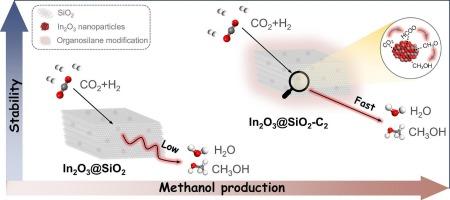Hydrophobic modification of SiO2-encapsulated In2O3 catalyst: Boosting efficient CO2 hydrogenation to methanol
IF 13.2
1区 工程技术
Q1 ENGINEERING, CHEMICAL
引用次数: 0
Abstract
The targeted design and optimization of the catalyst structure to boost catalytic efficiency is of great significance in heterogeneous catalysis, especially for CO2 hydrogenation. Herein, a catalyst comprising SiO2-encapsulated In2O3 particles was prepared, whose performance in CO2 hydrogenation to methanol was subsequently significantly advanced through modification of its external surface with organosilanes. Systematic characterizations confirm that the uniform dispersion of small In2O3 nanoparticles within SiO2 directly improves the efficiency and stability. Importantly, moderate hydrophobic modification can promote desorption of polar molecules (H2O and CH3OH), thereby accelerating methanol synthesis during prolonged experiments while preserving the structural integrity of the encapsulated In2O3. Further mechanistic studies reveal that moderate hydrophobic modification causes an increase in the concentrations of key intermediates in the methanol synthesis pathway, particularly CH3O*, which is primarily responsible for enhanced methanol productivity. This work provides valuable insights toward the rational design and performance modulation of catalysts for CO2 hydrogenation.

二氧化硅包封的In2O3催化剂的疏水改性:提高CO2加氢制甲醇的效率
有针对性地设计和优化催化剂结构以提高催化效率在多相催化,特别是CO2加氢催化中具有重要意义。本文制备了一种由sio2包封的In2O3颗粒组成的催化剂,通过对其外表面进行有机硅烷改性,显著提高了其在CO2加氢制甲醇中的性能。系统表征证实了细小的In2O3纳米颗粒在SiO2中的均匀分散直接提高了效率和稳定性。重要的是,适度的疏水修饰可以促进极性分子(H2O和CH3OH)的解吸,从而在长时间的实验中加速甲醇合成,同时保持封装的In2O3的结构完整性。进一步的机理研究表明,适度的疏水修饰导致甲醇合成途径中关键中间体浓度的增加,特别是ch30 *,这是提高甲醇生产率的主要原因。这项工作为CO2加氢催化剂的合理设计和性能调节提供了有价值的见解。
本文章由计算机程序翻译,如有差异,请以英文原文为准。
求助全文
约1分钟内获得全文
求助全文
来源期刊

Chemical Engineering Journal
工程技术-工程:化工
CiteScore
21.70
自引率
9.30%
发文量
6781
审稿时长
2.4 months
期刊介绍:
The Chemical Engineering Journal is an international research journal that invites contributions of original and novel fundamental research. It aims to provide an international platform for presenting original fundamental research, interpretative reviews, and discussions on new developments in chemical engineering. The journal welcomes papers that describe novel theory and its practical application, as well as those that demonstrate the transfer of techniques from other disciplines. It also welcomes reports on carefully conducted experimental work that is soundly interpreted. The main focus of the journal is on original and rigorous research results that have broad significance. The Catalysis section within the Chemical Engineering Journal focuses specifically on Experimental and Theoretical studies in the fields of heterogeneous catalysis, molecular catalysis, and biocatalysis. These studies have industrial impact on various sectors such as chemicals, energy, materials, foods, healthcare, and environmental protection.
 求助内容:
求助内容: 应助结果提醒方式:
应助结果提醒方式:


